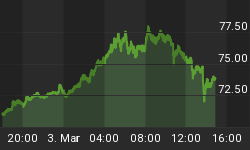"...Now that cheap money's vanished, where will consumers find enough cash to pay the bills...?"
THE CHEAP MONEY BUBBLE might have gone pop. But everywhere we look, the mischief of cheap money continues to cause mayhem for investors, savers, retirees, even school children.
"I've been in school service for 27 years and this is the worst it's ever been," said Sara Gasiorowski, a food services director for the school board in Indianapolis, to CNN Money on Wednesday.
"I have never seen food prices jump up so far."
Ms. Gasiorowski is now shuffling ingredients and switching menus to make her budgetary dollars stretch where they used to. But with each dollar buying ever less stuff, "there isn't enough money to go around," grumbles Lynnelle Grumbles, the wonderfully-named food service director of Visalia Unified School District in central California.
"For every penny on a carton of milk, it costs me $30,000 a year," she told the newswire. Note the 22% rise in her local milk prices since April '07 and "that's $105,000 extra on my food bill."
Overall, says the Bureau of Labor Statistics, US food prices - nationwide - have risen by 4.5% in the last 12 months. Here in the UK, according to the British Retail Consortium, food-price inflation is running at an "inflation-busting" 4.7% per year.
Throw in the 6.6% rise in travel fares - plus a 5.3% rise in motoring costs, the 5.8% rise in housing bills, and the 4.7% increase in the cost of heating and light at home - and you might wonder quite how the UK statistics agency came up with its latest "cost of living" figure.
The official Consumer Price Index rose by a mere 2.5% year-on-year in March. Thank heavens for all those furniture and clothing-store discounts! Without those mass fire-sales on discretionary goods, the cost of living would be rising nearly twice as quickly.
"Food prices are accelerating at their fastest rate since records began," reports the Daily Telegraph, "fuelling a rise in the average family's shopping bill of £750 a year [$1,480].
"The rate of food price inflation is making life increasingly difficult for the millions of families already struggling to make ends meet under the weight of rising council tax bills, mortgage repayments and energy costs."
In short, making ends meet is getting increasingly tough for consumers on both sides of the Pond. "Food prices were one of the issues we mentioned constantly," said Jean-Claude Trichet, head of the European Central Bank, when summing up the latest G10 meeting of finance chiefs on Monday.
"It is an additional element adding to the energy prices, to the metal prices and a number of commodity prices and that is really at a global level a very important phenomenon."
Never mind how we got here. Not for today, at least. Just how will consumers - meaning savers, investors and retirees - square this circle of surging costs?
The real mischief of the cheap money bubble, we think here at BullionVault, is not only that it's pushing living costs higher as the value of money evaporates.
The true mayhem is that consumer credit's dried up just as consumers need it the most.

Put inflation to one side if you can. Because in nominal terms, average weekly wages for US workers rose on average 4.5% per year over the last four decades and more.
Total consumer loans from the commercial banks, on the other hand, grew by 7.6% per year.
Since Alan Greenspan took the chair of the Federal Reserve, consumer loans have very nearly tripled. Hourly incomes - before accounting for increases in the cost of living - failed to double.
Time was, of course, that asking your bank for a loan was scarier than demanding a pay rise. But "innovative" credit turned that on its head. And so just as in the United Kingdom, the real driver for US consumer spending over the last decade and more has been the availability of cheap money.
Now the cheap money's vanished, where might consumers find enough cash to pay the bills?

Novel problems require novel solutions. And so "borrowing from retirement plans is surging," reports the Wall Street Journal.
"At the end of last year, 18% of US workers had loans outstanding from their plans, up from 11% in 2006, according to a survey by the Transamerica Center for Retirement Studies."
US and UK consumers have been hocking their futures for so long already, borrowing another few years from their retirement can't hurt. But what if saving - instead of borrowing - really does make a comeback? What if the '90s and '00s consumer boom ended with a return to pre-bubble pay demands?
"We cannot afford to get back into that culture of the 1970s and early 1980s," as Mervyn King, Bank of England chief, said to the UK parliament late last month. "People felt we can take gambles with what pay increases we agree because in the end the government will give in and allow inflation to rise to validate those decisions."
Now "we cannot do that" urged the Trimmer. So instead, he's now lending £50 billion ($97.5bn) of taxpayer's money to London's biggest banks, hoping they'll pass it onto consumers and keep the cheap money bubble expanding.
Otherwise, King warned yet again, inflation might get a foot-hold in people's wage expectations. As it is, for now, inflation remains locked on the debit side of household accounts. And that risks a shutdown in consumer spending until wages turn higher - or prices stop rising.
















